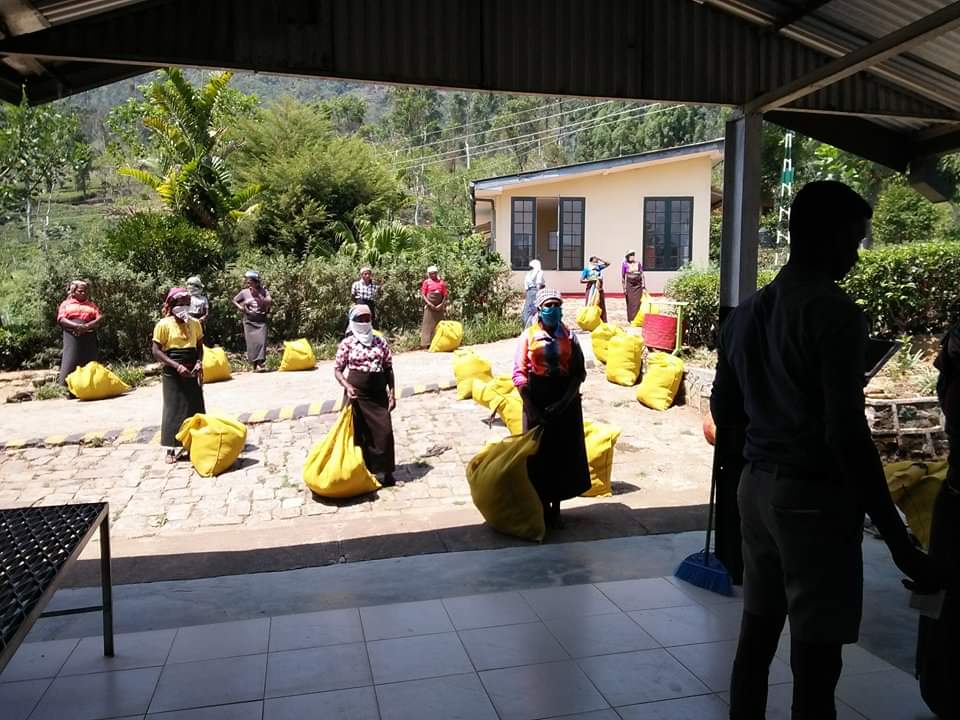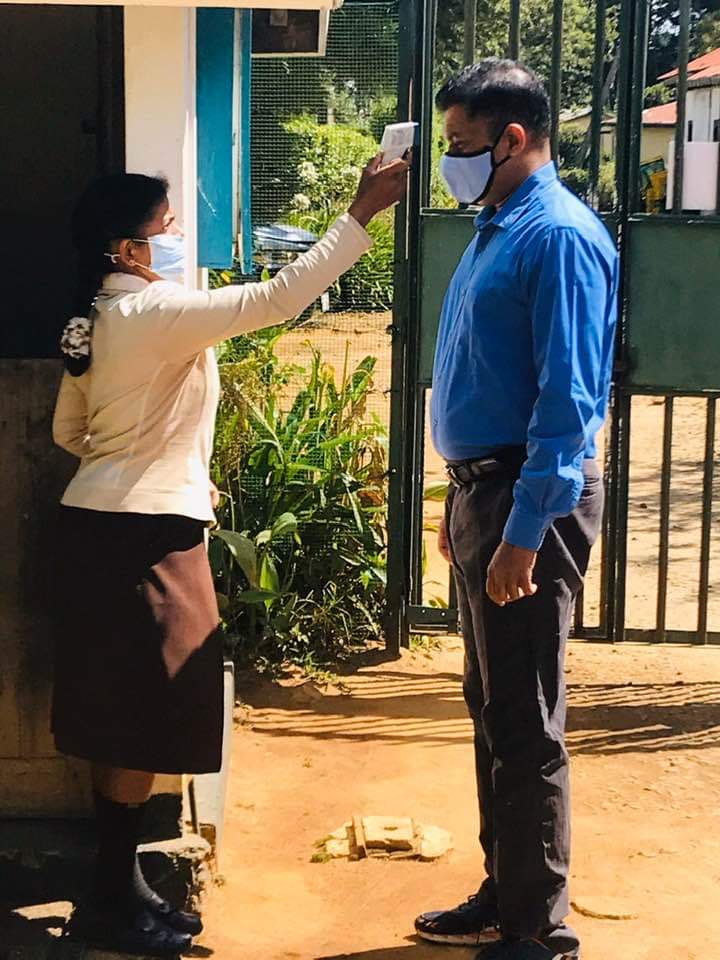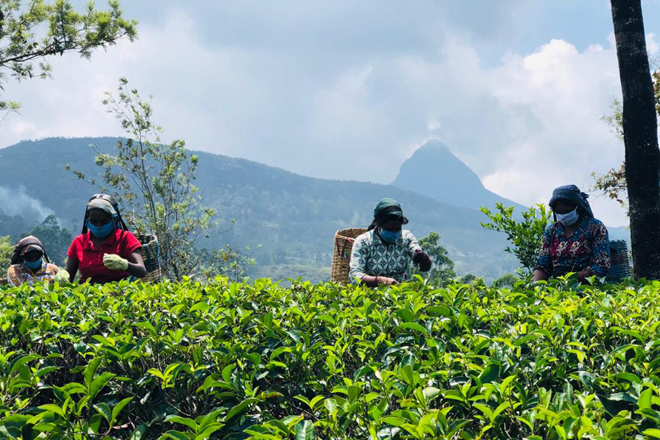Apr 16, 2020 (LBO) – Planters’ Association of Ceylon (PA) estimates a 40 percent drop in estate tea production solely resulting from unprecedented drought for the past 3 months.
PA Chairman, Sunil Poholiyadde releasing a statement said that the loss in crop had already created an increase in the cost of production.
However, given the unprecedented global supply chain disruptions unfolding as a result of the pandemic, Sri Lankan tea has attracted significantly improved prices by the close of the very first tea e-auction which took place on 3rd April 2020.
Poholiyadde warned that while improved prices would be useful in a crisis situation, currency depreciation also posed a serious challenge for the industry when considering its impact on increasing input costs, which together with lower production volumes – would negatively impact an already high cost of production.
In the case of the rubber sector, six auctions were delayed for a period of three weeks owing to the COVID-19 pandemic, despite increased production driven by favourable weather conditions in rubber growing regions. Poholiyadde noted that the interruption in auctions had caused acute difficulties for RPC cashflows.


Full statement
SL Plantation sector presses forward amidst tightened safety precautions, unprecedented drought
· Reiterates commitment to protect health of workers, resident estate community from COVID-19
· Calls for unity among stakeholders in the face of unprecedented challenges
· Estimates 40% drop in production solely resulting from unprecedented 3 month drought
· Commends RPCs for systematic resumption of work with only 4 days interruption
· Expresses gratitude to industry for success of first ever e-auction of Ceylon Tea
Following the Government declaration of the Plantations sector as an essential service, the Planters’ Association of Ceylon (PA) stated that RPC operations immediately gathered momentum amidst stringent new measures to protect workers and the wider estate community against the COVID-19 pandemic.
Expressing gratitude to all industry stakeholders and Government authorities for successfully enabling plantation sector to resume critical operations, PA Chairman, Sunil Poholiyadde stated:
“While work on the estates was halted by 13th March, as soon as the COVID pandemic worsened, most RPCs were able to resume work after only 4-days interruption. This was due to the remarkable initiative taken by the RPCs with the assistance of health authorities to institute stringent health and safety protocols, while ensuring that all workers and the wider estate community had their essential needs met.
“The challenges around COVID-19 add to the already pressing difficulties of tea producers who have been facing an unprecedented drought for the past 3 months which is estimated to have caused as much as a 40% reduction in estate production. The loss in crop had already created an increase in the cost of production (COP).”
Moving forward, he reiterated the total and continuing commitment of all RPCs to ensure that all possible precautions are taken to prevent the spread of COVID-19 among workers and the estate community, in compliance with guidelines issued by health authorities.
Poholiyadde also commended the success of each RPC in ensuring that employees were provided with food parcels as well as advances for food and other essentials, as well as special measures taken in partnership with Government authorities. Through such partnerships, rations were delivered directly to the estates, in order to avoid situations where community members would have otherwise been forced to stand in long queues.
At present, the RPC tea sector maintains a workforce of approximately 135,000, and is also responsible for the welfare of a wider estate community with an approximate population of 1 million since most the migrant workers have also returned to the estates.
“Having safely commenced work on the plantations, the next hurdle was the sale of produce at the Colombo Auction. After a lapse of two weeks, all stakeholders were able to agree and establish an electronic platform for the auction – this was and advancement which was on the cards for several years, but had not materialised.
“Hence we are grateful to all stakeholders for banding together and changing a system which is over one century old. In this manner, every aspect of the plantation supply chain – from production to transport, sale and export has now been restarted, under the strict oversight of Government. This is a remarkable achievement. Moving forward we will continue to work in partnership with the Government to monitor the situation and follow its directives, while making every effort to support the State with vital export earnings at this critical juncture,” Poholiyadde stated.
Given the unprecedented global supply chain disruptions unfolding as a result of the pandemic, Sri Lankan tea attracted significantly improved prices by the close of the very first tea e-auction which took place on 3rd April 2020. Higher prices were primarily a result of lower production, where weekly auction volumes were approximately 40% lower than in a normal cropping month, and sharp currency depreciation.
However, Poholiyadde warned that while improved prices would be useful in a crisis situation, currency depreciation also posed a serious challenge for the industry when considering its impact on increasing input costs, which together with lower production volumes – would negatively impact an already high cost of production.
In the case of the rubber sector, six auctions were delayed for a period of three weeks owing to the COVID-19 pandemic, despite increased production driven by favourable weather conditions in rubber growing regions. Poholiyadde noted that the interruption in auctions had caused acute difficulties for RPC cashflows.
“The resumption of auctions has been an extremely welcome development for the rubber sector as well. Prices have remained at relatively similar levels to before the COVID outbreak, however we will need to pay careful attention here given the sharp declines which were seen in global oil prices,” he stated.
Moving forward, the PA stated that its membership would continue to maintain protocols to ensure systematic hand sanitation strict hygiene practices and social distancing while all workers were issued protective equipment. Meanwhile, all staff and worker dwellings, as well as factory premises will continue to be disinfected on a regular basis.
“RPC mangers and staff are also on the frontlines in order to ensure that all estate communities are safeguarded and supported through this unprecedented global pandemic. All of this is being done at a time when up-country estates are experiencing an unprecedented and severe drought, meaning that there is low cropping.
“Despite the challenges, RPCs are fully committed to ensuring the health and safety of its employees. The PA and its members will also be carefully monitoring the situation as it develops, and will be ready to implement any further directives issued by the Government and health authorities on an urgent and immediate basis,” PA Media Spokesperson, Dr. Roshan Rajadurai stated.

